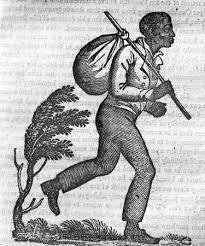 |
| Apollo Jefferson ran... |
It’s
the Year of our Lord 1820 in the Deep South. South Carolina announces penalties
for introducing any written anti-slavery material into the state. The white-male
led government feels slavery is a way of life in the south; they feel as if it
is the right thing to do. Plantation owners take their slaves to market,
breaking up families, mother taken away from children; wife’s separated from
husband, and regrettably, father’s removed from sons. This is the story of
Apollo Jefferson and the beginning chapter of “Slaves in Space: The Story of
Apollo Jefferson,” the slave who ran…
By Don Allen, Author – Slaves in
Space, Chapter 1: Hell
My
heart was racing, the sun in the sky felt like hot lava, my chest burned, my
vision blurred, and I truthfully felt as if I'd died long ago. Despite this
however, my legs continued to carry me through the woods, as far away from that
godforsaken plantation as possible. I willed myself to keep running, it would
be worth this pain just to never have to hear the word “boy” again. I’m not a
boy, I'm a man, and I, all of us, deserve more than working ourselves to death
in those atrocious cotton plantations. Just
a few more yards I told myself, just
a few more yards and then I’ll rest, and rest I did. My eyes grew heavy,
sweat poured down my face but I didn't care, I closed my eyes and slipped into
a deep sleep, or perhaps even a coma, either way I didn’t care...
I
awoke what I presumed was several hours later; I knew this as it was now dark.
Despite this however, there were no stars in the sky, in fact, I could barely
see a thing, and what’s more, it felt as if I was laying on a sheet of metal. I
panicked, something wasn't right, I wasn't in the woods underneath that tree
anymore, I was somewhere else, somewhere metallic. Had I been caught? No, I
would have awakened, surely? I got to my feet, made my way to what looked like
a dim crimson red due, perhaps a light, which was shining under what must have
been a door. I made my way through the darkness to what I hoped was the door,
fumbled around on the wall, and found some form of switch. A sudden THUD echoed
throughout the room, the huge door lifted effortlessly, and the entire room was
bathed in a deep red. I saw where I was, and what I saw made my blood turn to
ice.
Cages
after cages, filled with people just like me, and when I say just like me, I
mean slaves, I recognised half of them from the plantation I’d spent the summer
on. I recognised one lady, Bet, a sweet girl, and called out to her “Bet, bet,
can you hear me”. She slowly turned to me, looked me right in the face, yet
somehow she seemed different. Her eyes were vacant, almost dead, glazed over,
like a dead fish. “Bet, what’s going on”? Nothing, not a word. I made my way
down the lines of cages littering the entire room, and with each cage I
encountered, I grew more and more terrified. Some faces I recognized, some I
didn’t, and some faces, not even their own parents would recognize. They were
contorted in agony, their skin, once dark, was now silver, and the eyes were as
white as snow, as white as those devils that forced us to work ourselves to
death on the plantations.
I
was now petrified, these things in front of me weren’t human, they were demons,
devils, perhaps I’d died and was in hell? It would explain the crimson hue
washing over this room, and the near unbearable heat. I was snapped out of my god-awful
train of thought by a clinking noise, nothing too loud, but loud enough for it
to make my hair stand on end. “Who’s there”? I called out, yet immediately
wished I hadn’t when I received my reply. There was no voice, instead, a blood
curdling gargling shrieking sound. Out from the darkness and into the crimson
light stepped a creature, the likes of which I’d never seen before. Even
hunched over, it was taller than any person could ever be, its face was more
beast than man, its skin, silver and glistening, and it was looking right at
me. I slowly backed towards the exit but with one blood-curdling shriek, it
raced towards me, faster than any animal I’d ever seen before in my life.
It
was at that moment that I knew I was done for...






.jpg)